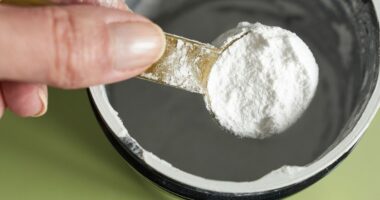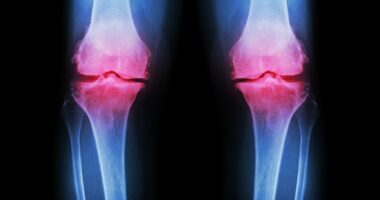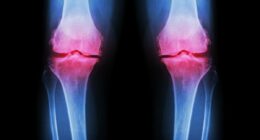Share this @internewscast.com
The woman sitting in my office appears somewhat annoyed. The 54-year-old mother of three – whom we’ll call Sarah – is here to discuss the recurring bladder infections she has been experiencing for months.
She’s tried antibiotics, cranberry supplements, drinking more water, cutting out caffeine – all the things that usually do the trick.
The symptoms never stay away for long, and the ongoing cycle of discomfort, doctor visits, and repeated antibiotic prescriptions is taking a toll on her.
When I suggest that hormone replacement therapy (HRT) might help, she looks taken aback.
‘I’m fed up with being in pain,’ she says, sharply. ‘I’m not looking for menopause pills.’ The subtext is clear: don’t fob me off.
She tells me she is well-acquainted with ‘HRT.’ Like many, her WhatsApp groups are filled with friends exchanging ‘miracle stories’ that extend well beyond alleviating hot flushes and night sweats.
One friend insists her skin is more radiant and her hair is fuller. Another jests about her husband’s constant grin now that she suddenly can’t seem to keep her hands to herself. A third declares the ‘brain fog’ has lifted, making her feel a decade younger.
To Sarah, who doesn’t think she has any menopause symptoms, it has always sounded like a fad.
But the truth is more interesting – and more useful.

Dr Ellie Cannon recommended HRT to a patient who didn’t think she has any menopause symptoms
It’s fairly common knowledge that decreasing oestrogen levels during menopause can lead to thinning and drying of the sensitive tissues in the vulva, vagina, and urethra, causing irritation and discomfort. However, fewer women seem to understand, in my experience, that this makes urinary tract infections much more likely, especially after intercourse.
In other words, a problem she sees as purely urological can, in many cases, be a menopausal problem in disguise.
And when that’s the case, the right form of HRT can be genuinely transformative.
This issue goes beyond just one consultation room. In the last ten years, the number of women taking HRT through the NHS has increased significantly, rising from about a million to approximately 2.6 million.
With celebrities praising it and social media brimming with personal testimonies, it’s easy to assume HRT is simply a lifestyle drug for hot flushes or, worse, a cure-all. It is neither. It is a medical treatment with clear indications, risks and benefits – and a broader range of applications than many women realise.
The menopause typically falls between the ages of 45 and 55. Periods become irregular and eventually stop as levels of the hormones oestrogen and progesterone decline.
That hormonal shift causes the classic symptoms: hot flushes, night sweats, poor sleep, mood swings, low libido, vaginal dryness. For women with these issues, HRT – usually via patches, gels or tablets – can be life-changing.
But research suggests about four in ten women are not troubled enough to want treatment.

HRT tablets carry a small risk of blood clots, but the therapy can help with the more than 30 symptoms listed in medical literature related to failing oestrogen
When I began writing my new book, The Little Book Of HRT, I aimed to answer the questions women ask me in clinic and dispel the myths. In doing so, I ended up-examining my own assumptions. Medical literature lists more than 30 symptoms linked to falling oestrogen.
Take joint pain. Aching knees, stiff hips, sore hands – it’s easy to chalk up these to age or early arthritis, which also tends to emerge in mid-life. But oestrogen helps keep joints and connective tissues healthy. As levels fall, pain can flare.
Headaches are often blamed on stress or screens, but can be triggered by fluctuating oestrogen.
Other symptoms mimic unrelated conditions. Heart palpitations can be alarming, and I’ve seen many women convinced they had long Covid or POTS (postural tachycardia syndrome) when the pattern pointed just as clearly to perimenopause. Dizziness, too, is often put down to vertigo but may stem from hormonal shifts.
If hormones are part of the picture, HRT may succeed where other approaches have not.
Back to Sarah. We discussed the options and agreed on topical vaginal oestrogen.
It strengthens thinning tissue and improves the barrier to infection. For many, that’s all that’s needed.
Within weeks the soreness settled, the infections slowed, and after a few months she had her life back. Most importantly, she understood why it was happening – and that knowledge alone was empowering.

HRT (pictured in patch form) is not a panacea. It won’t stop ageing, erase wrinkles or guarantee better sex, writes Dr Ellie Cannon
A word of balance. HRT is not a panacea. It won’t stop ageing, erase wrinkles or guarantee better sex. There are risks to weigh: tablets carry a small risk of blood clots, while patches and gels do not, and a history of certain cancers can alter the calculation. None of this should deter women, but it keeps the discussion rooted in medicine, not mythology.
Nor is every mid-life symptom is hormonal. Work, families and caring take their toll. Sometimes a headache is just stress, sometimes palpitations are thyroid disease or anaemia. That’s why the first step is always to see a GP.
There is no laboratory test you must pass to be allowed HRT. Diagnosis is clinical. That can feel imprecise, but it’s also why an honest conversation with a clinician who listens is so valuable.
What I would love is for more women to know the breadth of what the menopause can look like. If you’re between 40 and 65 and have a persistent, unexplained symptom – joint pains, headaches, palpitations, repeated UTIs – consider whether hormones could be part of the picture.
Used properly, HRT can be quietly – and profoundly – effective.
Dr Ellie Cannon’s new book, The Little Book Of HRT: Your Essential Guide To Hormones And Menopause, is available to order now.















